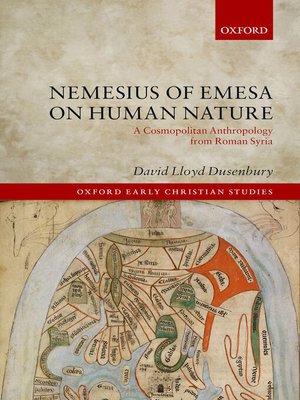Nemesius of Emesa on Human Nature
ebook ∣ A Cosmopolitan Anthropology from Roman Syria · Oxford Early Christian Studies
By David Lloyd Dusenbury

Sign up to save your library
With an OverDrive account, you can save your favorite libraries for at-a-glance information about availability. Find out more about OverDrive accounts.
Find this title in Libby, the library reading app by OverDrive.



Search for a digital library with this title
Title found at these libraries:
| Library Name | Distance |
|---|---|
| Loading... |
Nemesius of Emesa's On Human Nature (De Natura Hominis) is the first Christian anthropology. Written in Greek, circa 390 CE, it was read in half a dozen languages—from Baghdad to Oxford—well into the early modern period. Nemesius' text circulated in two Latin versions in the centuries that saw the rise of European universities, shaping scholastic theories of human nature. During the Renaissance there were numerous print editions helping to inspire a new discourse of human dignity. David Lloyd Dusenbury offers the first monograph in English on Nemesius' treatise. In the interpretation offered here, the Syrian bishop seeks to define the human qua human. His early Christian anthropology is cosmopolitan. He writes, 'Things that are natural are the same for all.' In his pages, a host of texts and discourses—biblical and medical, legal and philosophical—are made to converge upon a decisive tenet of Christian late antiquity: humans' natural freedom. For Nemesius, reason and choice are a divine double-strand of powers. Since he believes that both are a natural human inheritance, he concludes that much is 'in our power'. Nemesius defines humans as the only living beings who are at once ruler (intellect) and ruled (body). Because of this, the human is a 'little world', binding the rationality of angels to the flux of elements, the tranquillity of plants, and the impulsiveness of animals. This compelling study traces Nemesius' reasoning through the whole of On Human Nature, as he seeks to give a long-influential image of humankind both philosophical and anatomical proof.







